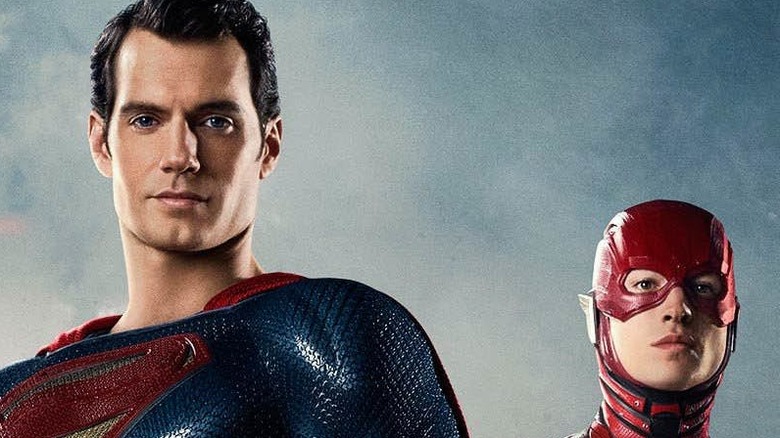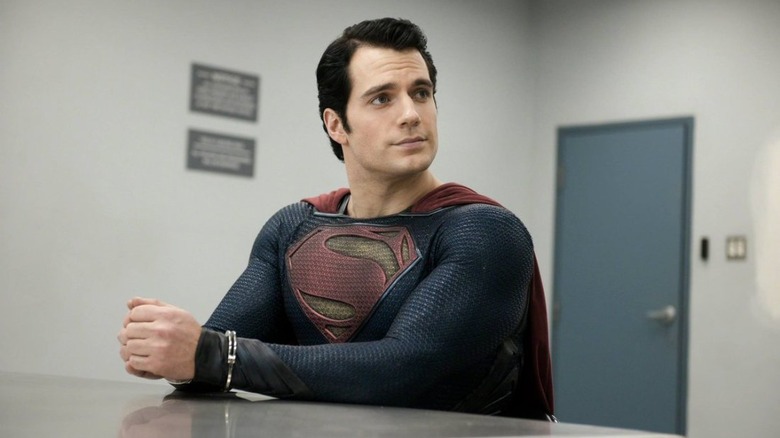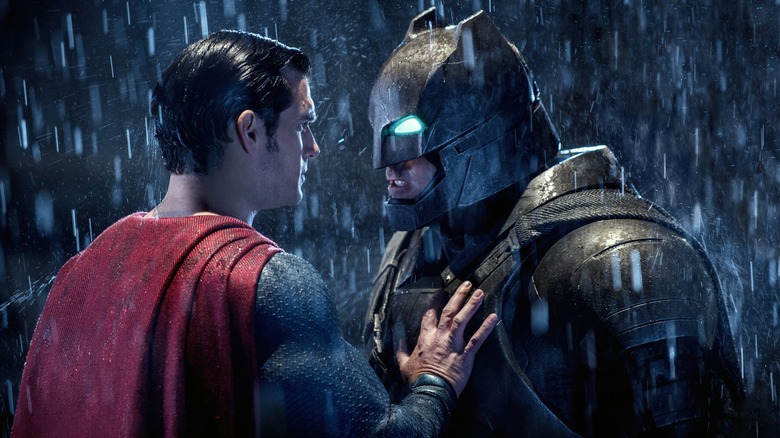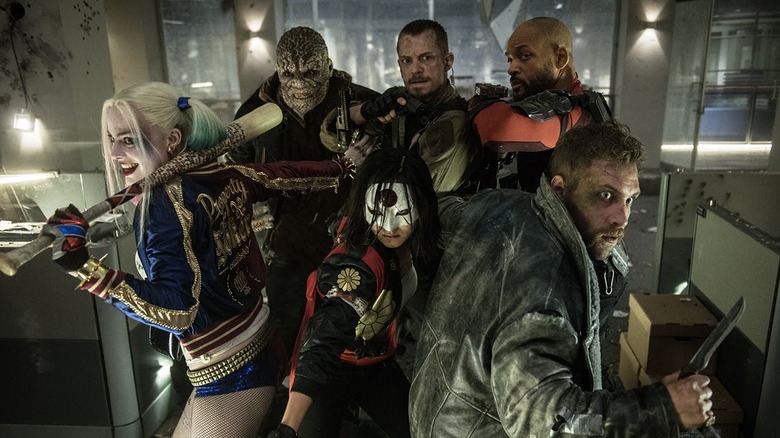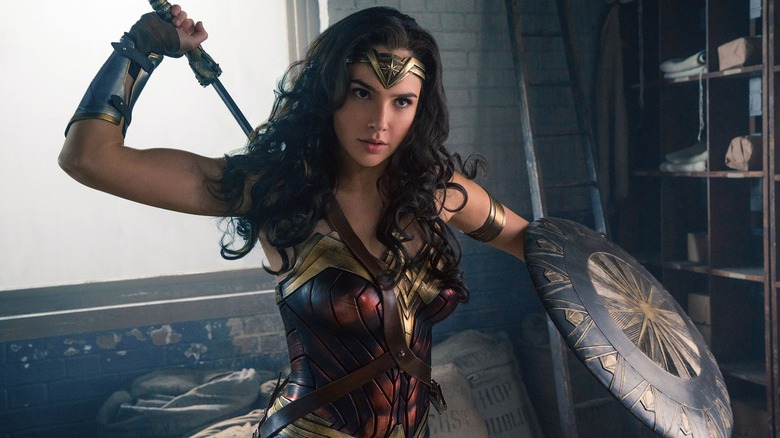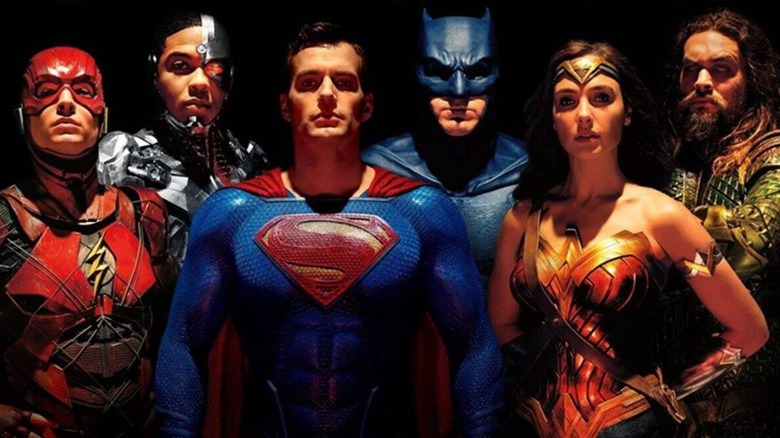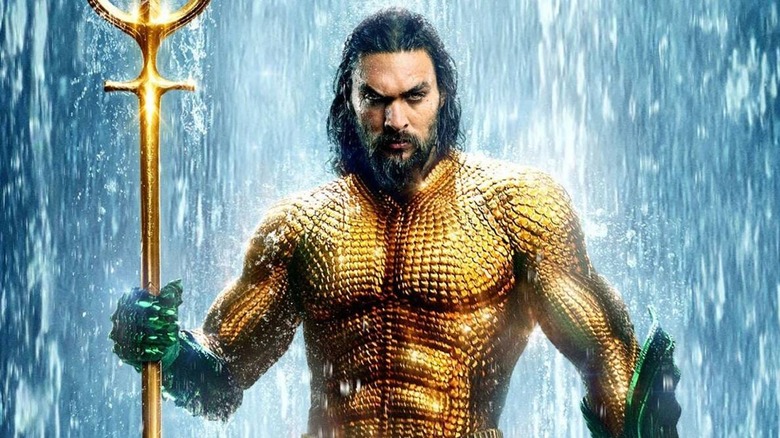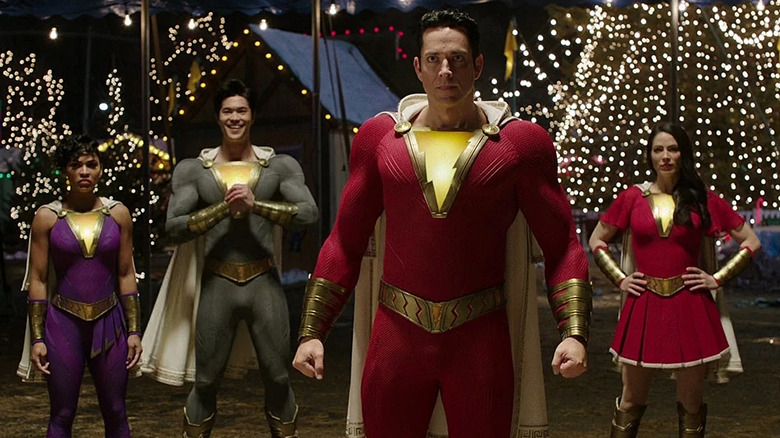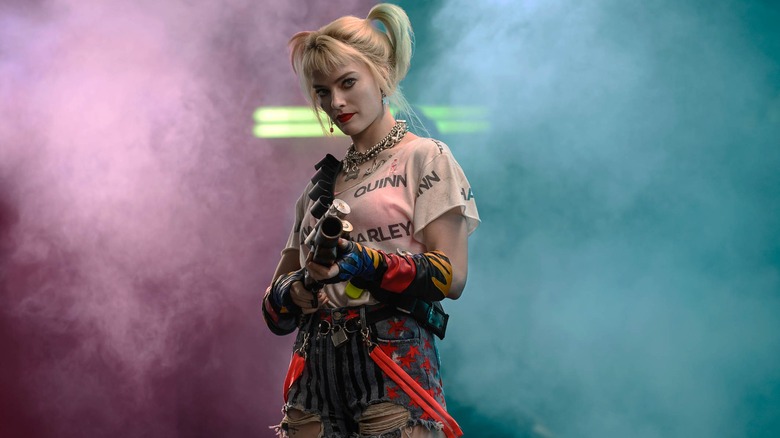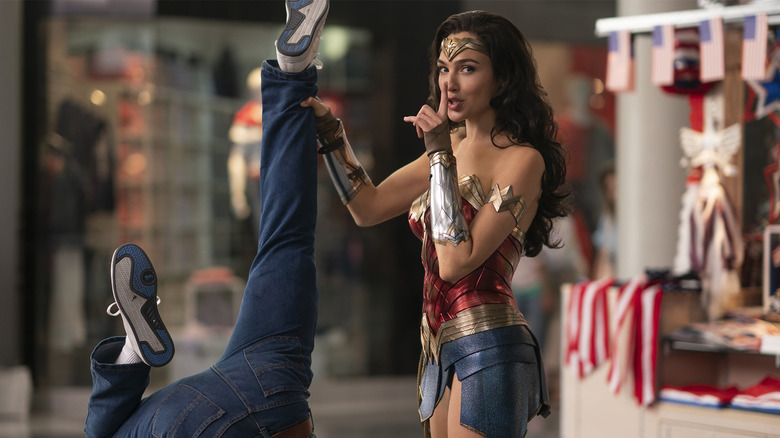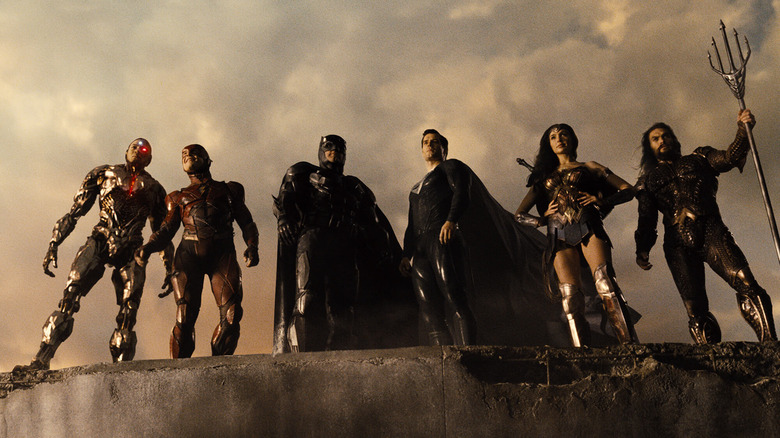The Dumbest Line In Every DCEU Movie
With a series of films as divisive as the DC Extended Universe (DCEU), it's fair to say that the movies aren't to everybody's taste. Whether it's because of changes that creators chose to make to the source material or issues with pacing, tone, or content, DC's attempt at a shared cinematic superhero universe has had its fair share of blunders amid its successes, but there are some lines in each film that leave just about everybody scratching their heads.
Whether it's Superman and Batman screaming "Martha!" at each other in "Batman v Superman: Dawn of Justice" or Steppenwolf creepily calling a bunch of boxes "mother" in Joss Whedon's "Justice League," even the films' most fervent fans and ardent supporters will come across that one line they'll choose to ignore and pretend never happened. Though time will tell how many movies and lines might be added to the bunch in the years to come, here are the dumbest lines from each film that has been released to date.
Man of Steel: "What was I supposed to do, just let them die?" "Maybe."
Zack Snyder's 2015 film, "Man of Steel," attempted to imagine how the modern world would react to the sudden appearance of a nearly all-powerful being like Superman, and with Jonathan Kent's constant warnings about how badly the world will react to Clark's abilities, the idea is firmly settled at the heart of the film. This mostly works, but it also results in one of the film's worst lines.
The line isn't as questionable as Jonathan's "sacrifice" later on, but it feels immediately out of place in a Superman movie. Having just pulled his classmate's school bus out of a river, Clark listens to his best friend's mom freak out about Clark's abilities. Eventually, Jonathan tries to explain to Clark that his friend's mother was a perfect example of how the world would react to his existence. Clark responds: "What was I supposed to do, just let them die?" His father replies: "Maybe."
This line flies in the face of what it means to be Superman. Above all else, Superman is the hero that saves everybody he possibly can, no matter the risk, and that is exactly what Jonathan Kent would have encouraged him to do in the comics. Superman is meant to be the moral center of the DC Universe, and he learns that from his parents. This line is antithetical to the very nature of Superman, and a critical misunderstanding of the character of Pa Kent — it hurts the movie, solely in pursuit of a cheap laugh.
Batman v Superman: "I want you to get everybody out of the building, right now!"
No, it's not "Martha." Directed by Zack Snyder and released in 2016, "Batman v Superman: Dawn of Justice" is a mouthful of a title that has some clunky lines of dialogue to match. Though the infamous exchange about Superman and Batman's mother has received its due share of ridicule, it at least serves a purpose and has a decent idea behind it, even if the execution is poor.
This line, on the other hand, does not have those redeeming qualities. The film is viewing the events of "Man of Steel" from Bruce Wayne's eyes as he flies towards his company's building in Metropolis while Zod and Superman's fight destroys the city. Bruce's helicopter lands, and the billionaire runs to an SUV, hops in, and starts driving furiously towards his employees. He calls the building's manager and exclaims: ""I want you to get everybody out of the building, right now!"
This begs two mind-boggling questions: Why were they still in the building in the first place, and why did Bruce wait so long to call them to tell them to evacuate? He could have called them at any point before the helicopter ride, during the flight, while getting to the car, and before driving, but instead he waited a while to reach out. If he had called first, or if his employees were thinking, how many more of them would still be alive? Not exactly Bruce Wayne's most heroic moment.
Suicide Squad: "So that's it? What? We some kinda ... Suicide Squad?"
It's 2016, and the second DCEU film that year has finally hit theaters. After multiple sequences featuring flashy graphics and classic pop songs that introduce the members of the team several times each, it's finally time for the movie's villains to suit up and get to work, and viewers are hit with this line:
"So that's it? What? We some kinda ... Suicide Squad?"
From the moment this line hit the internet in the film's trailers, it became one of the DCEU's most famous and long-lived memes. The line is one of the clunkiest examples of filmmakers' desire to explain the name of a film, franchise, or team "organically" within the film. Like Han receiving his famous name from a random customs official in "Solo: A Star Wars Story," this line just doesn't work, and can't help but take viewers completely out of the film.
Wonder Woman: "You kill the God of War, you stop the war."
Patty Jenkin's 2017 film, "Wonder Woman," is great, and even more impressively, it's unique. Though the final fight in the third act becomes a more standard super-powered fight, the rest of the film is fiercely original and often inspiring. One aspect that fails to meet the movie's high marks, however, is best represented in one line towards the end of the movie: "You kill the God of War, you stop the war."
The entire film, from Diana's upbringing on Themyscira to Steve Trevor and the Germans' arrival on Paradise Island's shores to her efforts to end the First World War, hinges around Diana's belief that Ares is the one causing all of the horror and bloodshed. Believing that Ares has disguised himself as the German General Ludendorff, she confronts and kills the man, but is horrified when the fighting doesn't stop.
This is a brilliant twist that subverts the expectations of both the protagonist and the audience, one that truly challenges Diana's character and belief in humanity, but it is dropped almost immediately. After Ludendorff is dead, Ares reveals himself to Diana, and when she eventually defeats him, all of the soldiers in the area immediately stop fighting and look like they've just woken up from being mind-controlled. What was the point of perfectly executing that wonderful twist and communicating a powerful message about humanity if you're going to ditch it by the end of the film?
Justice League: "You smell good."
In the process of finally limping into theaters, Joss Whedon's "Justice League" had cut Zack Snyder's four-and-a-half hour movie to two hours. The result. understandably, is messy and relied on a lot of "automated dialogue replacement." Commonly referred to as "ADR," this is the process of re-recording lines of dialogue and editing them in to the scenes during post-production.
The release of "Zack Snyder's Justice League" on HBO Max made it easy to spot all that ADR use in the theatrical cut. Most of it works well, but the movie's worst line of dialogue was also its most poorly-replaced.
After Superman's resurrection, he takes Lois and flies her back to the Kent Farm in Smallville. When they get there, Lois is happy to see that Clark has recovered enough to remember where he grew up. He confidently states, "This is home," to which Lois inexplicably replies, "You smell good."
It comes out of nowhere, is played for laughs, and utterly falls flat, and the director's cut reveals that the line was meant to be, "You spoke." It was supposed to be Superman's first line after he came back to life, but Whedon had to change it because he chose to have Superman speak before that point. The original line's meaning was lost and replaced with something worse, and it's so poorly dubbed that you can still see Lois' lips say "You spoke."
Aquaman: "Many are asking the question, 'Was this a natural disaster or something else?'"
In the first act of James Wan's "Aquaman," the movie's villain, the Ocean Master, creates a worldwide tidal wave that purposefully beaches only the world's warships and the vast amount of pollution and garbage in the ocean. When the tidal wave has subsided, ninety-nine percent of the debris on the world's shores is trash and military vessels, and yet, despite this very specific and obvious targeting, a news reporter still chooses to say, "Many are asking the question, 'Was this a natural disaster or something else?'"
It is very obviously something else. The idea that a natural disaster could specifically return just the world's trash and naval vessels to the shore all over the world all at once is ludicrous. However crazy it might seem to people that a tidal wave could have targets, it's readily apparent that it did, and the fact that it happened literally everywhere at the same time should make it perfectly clear that this was "something else."
Shazam! "Lay your hands on this staff." "Gross."
Billy Batson is "just" another foster kid in David Sandberg's "Shazam!" until a strange, isolated wizard brings him to the Rock of Eternity and bestows the powers of six gods upon a fairly immature child. Billy has to grow up a lot throughout the film in order to become the hero that his new family needs — but before that happens, the film simultaneously delivers its worst joke and its worst line of dialogue.
The Wizard Shazam: "Lay your hands on this staff."
Billy Batson: "Gross."
Sure, it's the kind of awkward joke someone Billy's age might make, but it's completely tasteless and poorly executed. The Wizard is very clearly and obviously holding out a massive, glowing wizard's staff towards Billy. It could not be clearer what he means, so when Billy responds, the "joke" feels extremely forced, and that's on top of the fact that the joke is a creepy reference to pedophilia in a children's movie. The joke is horrible in both form and content, and the film would be far better without it.
Birds of Prey: "Told you she had a killer voice."
One of the main characters in Cathy Yan's "Birds of Prey and the Fantabulous Emancipation of One Harley Quinn" is Dinah Lance, the Black Canary. Played by Jurnee Smollett, Dinah begins the film as a singer at Black Mask's bar. Detective Renee Montoya tries to convince Dinah to use the powers she inherited from mother to help others in the same way, but Dinah wants nothing to do with it. She just wants to get by and survive as best she can.
The film does not let her, instead forcing Dinah to help Harley Quinn and a young girl named Cassandra Cain while both the movie and Harley's narration constantly hint at her supersonic "Canary Cry." When the moment finally comes for Dinah to use her superpower, Harley remarks, "Told you she had a killer voice."
It's a simple line with a simple joke, and it wouldn't be all that bad if it wasn't the second or third time that Harley had made that comment during the movie. It's a dumb play on words that is neither new nor original, and "Birds of Prey" chose to use it multiple times. In a film that has otherwise excellent dialogue, it's an odd, lazy choice.
Wonder Woman 1984: "I wish you dropped dead."
The central MacGuffin of Patty Jenkins' "Wonder Woman 1984" is a literal wishing stone that takes something for every single wish it grants. As a mystic artifact that is absorbed by the movie's villain, Maxwell Lord, its rules and uses are understandably inconsistent. At one point it can only resurrect Steve Trevor by making him taking over someone else's body, and at another it creates an entire, nation-long wall out of thin air.
Sometimes it takes some wishes literally and others metaphorically, and the many disparities create a sort of tonal whiplash at times during the movie. The best, or worst, example of this occurs during the final act when Maxwell Lord is broadcasting his message and granting wishes across the entire world. Some people make wishes on purpose, but one man has a wish granted that was literally just a figure of speech gone horribly wrong. During an argument with his wife, a man decides to say, "I wish you dropped dead!"
She does, but is resurrected by the end of the film when the man takes back his wish at Wonder Woman's bequest. The problem is, the moment is completely absurd. It seems pretty clear that the line isn't meant to be funny or played for laughs, but it's so hilariously out of place that it just doesn't work at all.
Zack Snyder's Justice League: The entire post-credits scene with Batman and Joker
After DC Comics announced that the long-rumored "Snyder Cut" would be released on its new streaming service, HBO Max, the film's director spent months hyping up a newly-filmed scene that would finally depict Ben Affleck's Batman meeting Jared Leto's Joker, and after four-and-a-half hours of slow motion, CGI, and a ton of world-building, the audience finally got to see the historic moment.
It was awful.
From Amber Heard's Mera foolishly believing she can kill Superman to the fact that the team decides to step out into the open and have a long conversation where anyone can see them, the scene is so cringe-inducing that it was impossible to pick just a single line of dialogue. The entire exchange between Batman and the Joker is the definition of "wannabe edgy," as Joker rubs Robin's demise in Batman's face and weirdly pontificates about death while Batman pointlessly threatens Joker over and over again, yet does nothing.
To top it all off, Joker throws in a homophobic joke, and then Batman seems to brag about killing Harley Quinn before saying the f-word while promising to kill the Joker just to show how "dark" and "hardcore" he is now in this excessively-depressing timeline. The one benefit of Snyder's version of "Justice League" never making it to theaters is that this scene was never canon to begin with.
